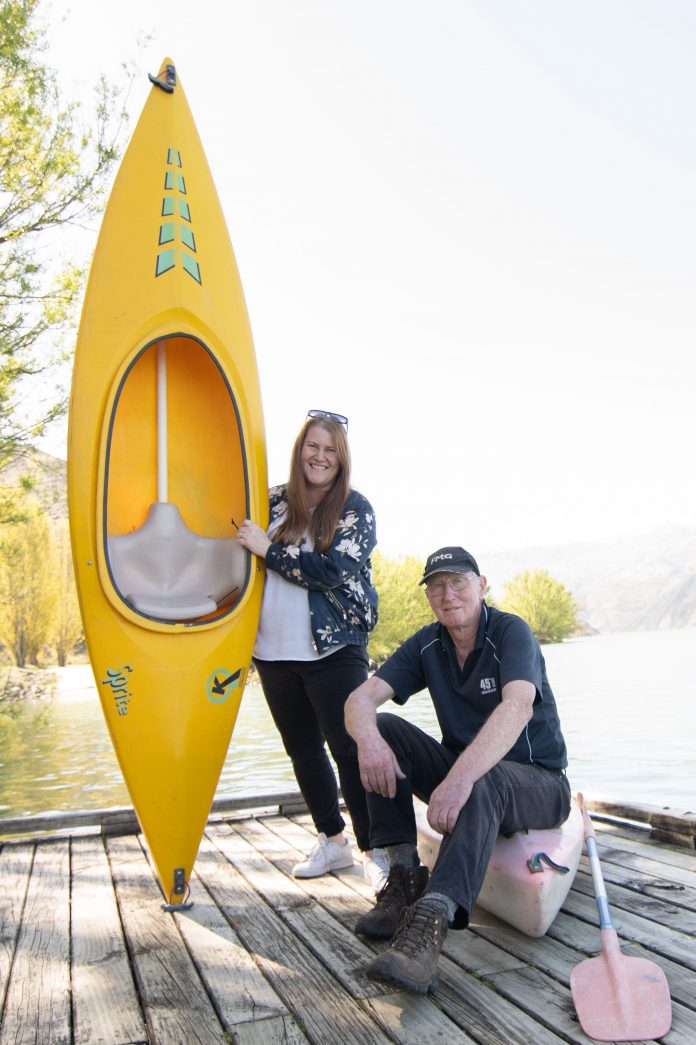
A Clyde man floated his dream of making early detection of skin cancer freely available to everyone and his family has stuck their oars in to help make it a reality.
Clyde and Districts Lions Club member James Whyte — a red-headed, fair-skinned retired farmer — has been battling skin cancers, including melanoma, for decades.
‘‘It keeps biting me in the bum.’’
He was a farmer all his working life. In the 1970s when he left school there was not the awareness of the danger of sun exposure and skin cancers.
‘‘To be honest it’s been 50 years of abuse really. Back then we didn’t have the knowledge that we know now. I remember sitting on the tractors in stinking hot weather and we’d mix vinegar with cod liver oil thinking it was going to save us [from] burning but we were just cooking our skin. That was a common trend in those days.’’
In the past two years Mr Whyte has had about seven melanomas removed as well as other skin cancers.
‘‘It’s not stopping. That’s where it is unfortunately.’’
He has been seeing a dermatologist for more than 20 years. A GP referred him and the specialist he saw then used liquid nitrogen burning off suspect areas.
Later he developed what felt like a cold sore on his lip which in three or four months grew to a point where he could not eat. It was operated on and found it was not melanoma but was still invasive.
Mr Whyte has had the skin on his face peeled twice, his arms and recently had his neck treated. The latest peel showed how many potentially cancerous areas there were on his neck.
‘‘That’s what gave me the motivation.’’
To ensure everyone has access to early detection of skin cancers Mr Whyte, along with his daughter Shannon Thomson and two grandsons, will be kayaking Lake Dunstan from Northburn to the Dunstan Rowing Club at Labour weekend. They are all seeking sponsorship to raise money for Rowing for Life Aotoearoa.
Mrs Thomson said she did not remember a time when melanoma was not part of their family but did not realise how serious it was.
‘‘I thought you had it cut out and carried on.’’
The experience of a member of their extended family brought home how serious it really could be.
As a teen she realised if she got burned to a crisp she would get a fantastic tan. As she got older, and had her own children who were fair skinned and susceptible to melanoma, she had become more aware of the potential danger.
She was keen to join her father in his fundraising efforts but was a little worried about keeping up with him as well as her son and nephew.
‘‘Dad is a mountain goat — he just keeps going. I’ve got to try and not get left behind.’’
After a chance meeting on a southern beach in 2020 between Ian Hamilton, of Invercargill, and Lions club member Colin McDonald, of Tokanui, a partnership was formed to raise money for four charities — Child Cancer Foundation, Starship Hospital, Surf Lifesaving New Zealand and the Lions Cancer Trust.
Mr Hamilton wanted to row the east coast of New Zealand to raise money for Child Cancer Foundation and Starship because of a family connection with both and Surf Lifesaving because of their support during other rowing events.
Lions were raising money for those organisations and Mr McDonald suggested they could pool their efforts. They also added the Lions Clubs New Zealand cancer skin screening trust to the beneficiaries with all funds raised throughout the country split equally between the four charities.
Mr Hamilton is planning to row from Port Pegasus, at Stewart Island, on December 2 and finish up at Cape Reinga in July. People would be rowing with him along the way.
Living inland meant that accompanying Mr Hamilton on the coast was not possible but Mr Whyte said he quickly decided to row Lake Dunstan to raise money for the cause.
At Labour weekend, when the Whyte family are doing their row, Mr Hamilton will be in Central Otago with the boat he will be rowing up the coast. It also coincides with the Dunstan Arm Rowing Club’s annual Cromwell to Clyde race.
Dunstan Arm Rowing Club captain Simon Smith said the would be between 40 and 80 boats of various configurations which would mean a lot of people racing from the old Cromwell Bridge to the Clyde dam.
Lions Club members will be out at the rowing club with buckets collecting money and running a sausage sizzle for everyone.
Mr Whyte said the Lions mobile skin cancer service was based on a successful one in Western Australia which began in 1994.
Melanoma was a ‘‘silent killer’’ with no age barriers. The Lions screening service would offer full body screening by trained health professionals. If any issues were detected a referral would be sent to the patients GP for further action.
Initially two customised vehicles would be deployed, one in each main island. They would be at field days, events and visit towns, Mr Whyte said.




